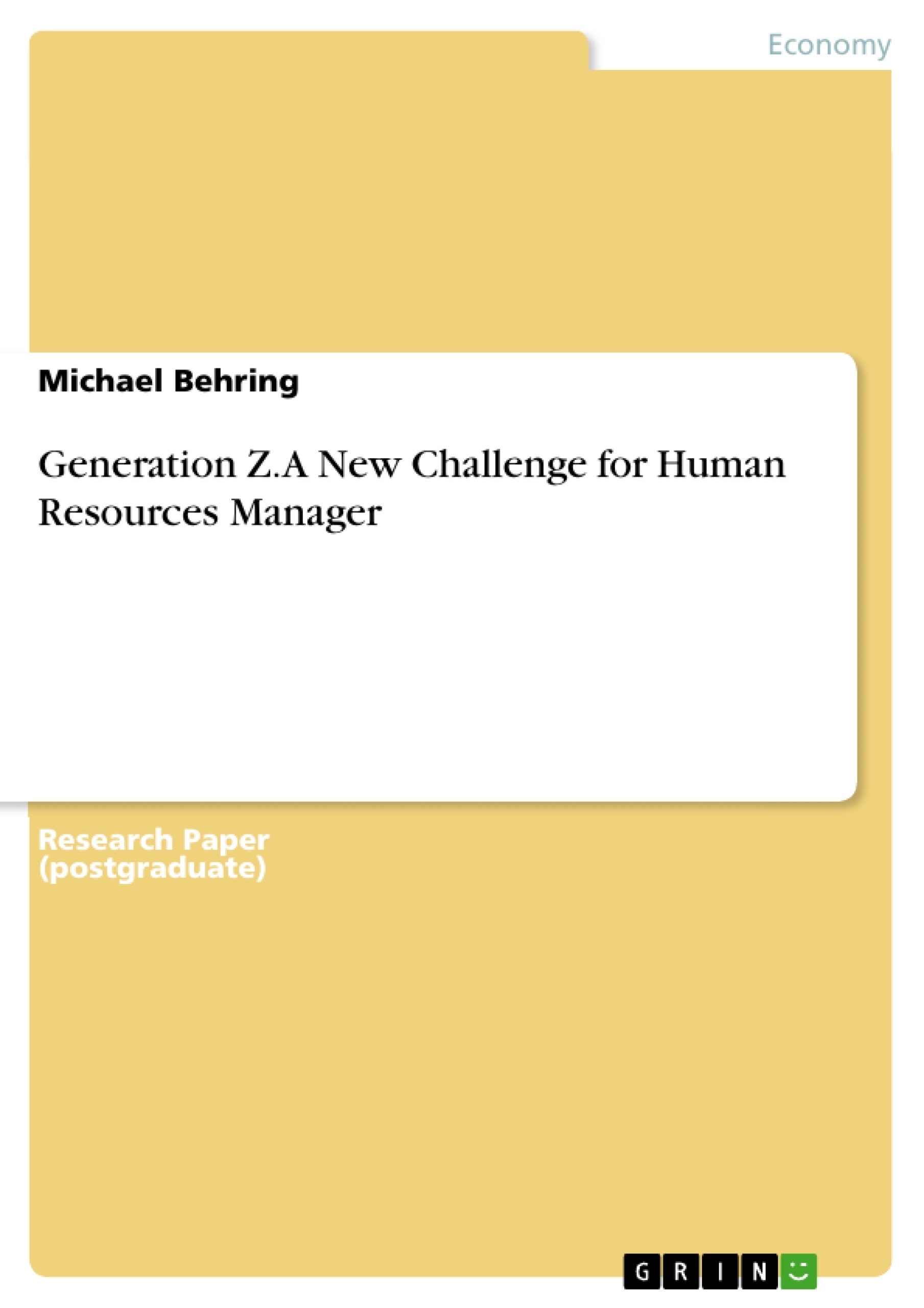Generation Z will play a crucial role in the labour market in the future. For this reason, employers are well advised to take a close look at this generation in order to determine how to attract and retain this generation. This paper tries to do exactly that. Additionally, it also provides some insights into the preceding generations X and Y.
For several years now, a new generation has been entering professional life. Namely, Generation Z, made up of people who saw the light of day from 1995 onwards. This generation, which is also known as the "Internet generation" or "iGeneration", is considered to have drastically changed values and behavioural patterns compared to
previous generations.
Inhaltsverzeichnis (Table of Contents)
- Introduction
- Problem
- Objectives/structure of the work
- Theoretical basics
- Selected generations on the German labour market
- Baby Boomer
- Generation X
- Generation Y
- Generation Z
- Requirements for future personnel work
- Expectations for the professional life
- Effects on personnel recruitment
- Candidate approach/employer branding
- Selection process
- Integration process (Onboarding)
- Effects on personnel management
- Communication, collaboration and motivation
- Leadership behaviour
- Effects on human resources development
- Development measures for Generation Z
- Career planning
- An overview of the most important recommendations for action in personnel work
- Limits of feasibility for human resources management
- Conclusion
Zielsetzung und Themenschwerpunkte (Objectives and Key Themes)
This paper aims to show employers how to shape their human resources work in the future regarding Generation Z. The work focuses on understanding the needs and expectations of Generation Z in the context of the modern labor market. The paper explores how to attract, retain, and manage this generation effectively within the workplace.
- Understanding the characteristics and expectations of Generation Z
- Analyzing the impact of Generation Z on human resources practices
- Developing strategies for effective recruitment and retention of Generation Z employees
- Identifying key challenges and limitations in managing Generation Z in the workforce
Zusammenfassung der Kapitel (Chapter Summaries)
- Introduction: This chapter introduces the concept of Generation Z and highlights the emerging challenges and opportunities for employers in managing this generation. It also outlines the objectives and methodology of the paper.
- Theoretical basics: This chapter explores the generational topic and provides a comprehensive overview of existing research on Generation Z. It emphasizes the unique attitudes, values, and behavioral patterns of Generation Z, comparing them to previous generations.
- Requirements for future personnel work: This chapter examines the specific requirements for human resources practices in relation to Generation Z. It focuses on recruitment and retention strategies, addressing the expectations of Generation Z regarding career opportunities, leadership styles, and development opportunities.
Schlüsselwörter (Keywords)
Key terms and concepts covered in the paper include Generation Z, human resources management, recruitment, retention, employer branding, leadership, communication, collaboration, and motivation. The paper investigates the impact of Generation Z on these areas and provides insights into effective human resources practices for managing this generation.
Frequently Asked Questions
What defines Generation Z in the labor market?
Generation Z refers to people born from 1995 onwards. They are known as the "Internet generation" and possess different values and behavioral patterns compared to Baby Boomers, Gen X, and Gen Y.
How can employers attract Generation Z candidates?
Effective recruitment strategies for Gen Z include strong employer branding, a digital-first candidate approach, and a streamlined selection and onboarding process tailored to their expectations.
What are Gen Z's expectations for professional life?
They value clear communication, meaningful collaboration, and development opportunities. They also expect leadership styles that are supportive and motivating rather than purely hierarchical.
What are the challenges in managing Generation Z?
Managers may face challenges regarding motivation and retention, as Gen Z has high expectations for career planning and work-life balance that may differ from traditional corporate structures.
What roles do communication and leadership play for Gen Z?
Effective leadership for Gen Z requires a shift toward more transparent communication and collaborative leadership behaviors to maintain high levels of engagement and motivation.
- Citar trabajo
- Michael Behring (Autor), 2019, Generation Z. A New Challenge for Human Resources Manager, Múnich, GRIN Verlag, https://www.grin.com/document/941696



